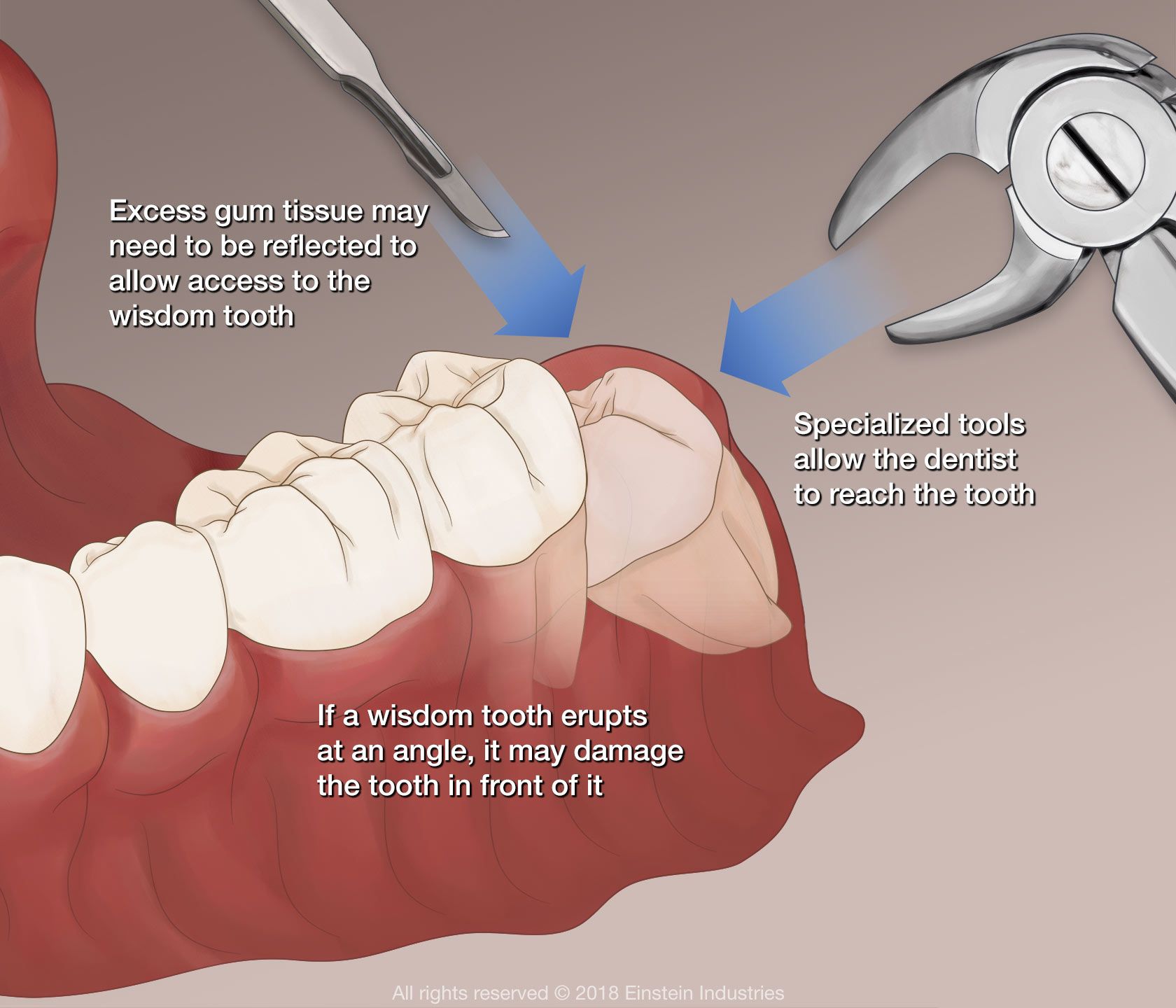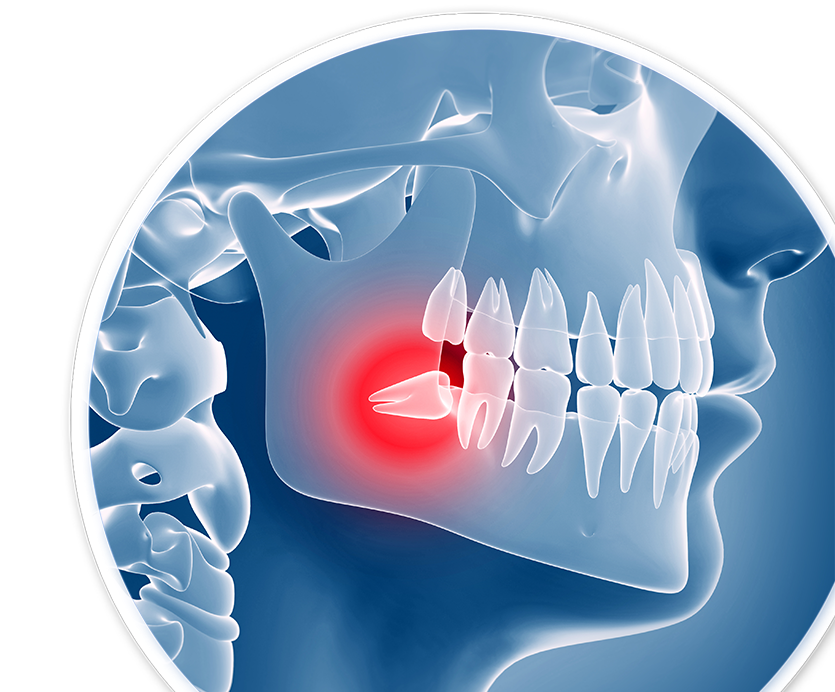Anesthesia and Sedation Help Make This a Virtually Pain-Free Procedure
Improved Comfort
Your doctor can provide pain medications and a specific set of instructions to help keep you as comfortable as possible during treatment and throughout recovery. Following treatment, you can expect relief from painful symptoms.
Improved Confidence
Once you have completely healed, you can feel confident knowing that you have improved your oral health and minimized your risk of periodontal disease, sinus issues, inflamed gums, and cavities.
Conservative Care
The removal of your wisdom teeth can help prevent the need for more expensive and invasive surgical procedures.
I'm happy to hear about the positives...
Will you show me how the procedure is performed?


But why did my friend never need to have their wisdom teeth removed?
Not everybody will experience pain or complications as a result of their wisdom teeth. They may need to be removed if they are impacted or erupting at an improper angle, or if you do not have enough room in your jaw. Even if a patient does not experience these initial complications, it does not necessarily mean that they will never experience some issues.
So how do I know if my wisdom teeth need to come out?
Common Signs of Wisdom Tooth Issues
Typically, your dentist will notice problems with your wisdom teeth before you do. They can often see potential issues using x-rays at your regular check-up. However, there are some common warning signs you can look out for when it comes to wisdom tooth problems:
Bad Breath
A persistent bad taste in your mouth or chronic bad breath often signals an infection. When wisdom teeth grow in incorrectly or become impacted, they can become more vulnerable to decay and other issues.
Inflamed Gums
Irritation from your wisdom teeth can cause your gums to swell and become red and painful. This can also lead to gum disease.
Cavities
Since the back of your mouth is difficult to reach, cavities form easily on the surface of wisdom teeth. Once decay forms, it can quickly spread to other teeth and cause widespread health issues.
Sinus Issues
In your upper jaw, wisdom teeth may be located close to the sinuses. You may notice sinus pain or pressure, headaches, or congestion.
Crooked Teeth
For many patients, wisdom teeth grow in at an angle, putting pressure on other teeth and causing them to shift. In others, teeth may move when wisdom teeth erupt because there is not enough room in the jaw.
Let’s take a closer look at what wisdom teeth can do to your smile...
So what can I expect during the procedure?
7 Steps of Wisdom Tooth Extraction
“ Extracting wisdom teeth is typically effective for alleviating discomfort and other symptoms. ”
“ Extracting wisdom teeth is typically effective for alleviating discomfort and other symptoms. ”
The doctor will take x-rays to determine how many wisdom teeth need to be extracted.
Anesthesia or sedation will be administered to numb the gums and areas surrounding the tooth.
An incision is made in the gums.
The tooth is gently extracted, either in one piece or separated into smaller pieces for easier removal.
Dissolvable sutures are used to close the incision.
Pressure is placed on the extraction site with a small piece of wet cotton gauze.
You can return home to begin your recovery process.
Does it really work?
When to Call Your Doctor after Your Procedure
Extracting wisdom teeth is typically effective for alleviating discomfort and other symptoms. Many patients do not even require a follow-up appointment with their dentist.
However, you should visit your dentist if you need stitches removed or if you develop symptoms, such as:
- Excessive bleeding
- Difficulty breathing or swallowing
- Fever
- A persistent bad taste in your mouth
- Lasting numbness
- Blood or pus when you blow your nose
- Swelling that worsens after the second or third day
- Severe pain that is not relieved by pain medications
So how will wisdom tooth removal affect my smile?


Recovering after Your Procedure
It typically takes about two weeks to fully heal after wisdom tooth removal. However, most patients can return to their normal activities the day after surgery.
Stages of Recovery
First 24 hours
Blood clots form where the extracted teeth were. You may notice some blood oozing at the surgical sit. Do not brush your teeth, rinse your mouth, spit, or use mouthwash during this period.
Two to Three Days
Swelling and bruising is normal during this time and usually improves by the third day. You can use an ice pack or a warm heating pad to relieve discomfort and bring down swelling. You can also resume brushing and eating more solid foods.
Seven Days
Wait for about a week before using a straw to avoid dislodging your blood clots. If you have non-dissolvable stitches, your dentist can remove them at this time.
Seven to Ten Days
For most patients, symptoms begin to disappear by this time. Jaw stiffness and soreness should go away.
Two Weeks
Often, bruising is the last symptom to fade. However, recovery time will be different for everyone.
Should I be worried if my doctor says I need my wisdom teeth out?
Do I really need to get an extraction?
Take Action Today
If your wisdom teeth are causing painful symptoms, or if your dentist tells you that you need to have them removed, delayed treatment can only cause more problems in the future. It is not worth jeopardizing your oral health when the problem can be easily resolved with minimal discomfort. This is especially true when you consider that delaying removal may present a need for much more expensive and invasive procedures.
Do not let fear or misconceptions about wisdom tooth removal keep you from achieving optimal oral health.
If you are experiencing symptoms of wisdom teeth complications, or if you are interested in preventive extraction for your child, schedule a consultation today.
“Maintaining your oral health can help you improve your overall health and enhance your quality of life.” Dr. Edward J. Zuckerberg
“Maintaining your oral health can help you improve your overall health and enhance your quality of life.” Dr. Edward J. Zuckerberg




